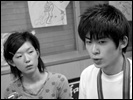Moon and Cherry
- Year
- 2005
- Original title
- Tsuki to Cherri
- Japanese title
- 月とチェリー
- Alternative title
- Electric Button
- Director
- Cast
- Running time
- 82 minutes
- Published
- 22 March 2007



by Tom Mes
In search of extra credit, student Tadokoro (Nagaoka) joins his university's most obscure extracurricular circle, the erotic writing club. In a cramped room whose four walls are covered floor to ceiling with nudie posters, he encounters a somewhat lifeless gathering of five men around a table, presided by the 56-year-old Sakamoto (veteran Emoto of The Eel and Dr. Akagi fame), who is still enrolled in the school because "being married gives you a discount on tuition."
The club's sole female member, the spunky Mayama (Eguchi, more about whom in a moment), is also its most talented, already contributing stories to a weekly men's magazine and getting paid for them to boot. Mayama immediately spots the virgin and takes the newcomer back to her place for a deflowering. No sooner has the cherry popped or she is in front of her computer to incorporate the experience in the latest instalment of her serialised fiction about the adventures of a 14-year-old virginal boy and the lady who educates him in the ways of the woman. Tadokoro quickly becomes Mayama's case study and model for the ongoing plot, but he realises he wants more from this uncommonly self-assured girl than bouts of skilful sex.
Originally made as an entry in the Love Collection series (whose other standouts were Kazuyoshi Kumakiri's Volatile Woman and Ryuichi Hiroki's Girlfriend / Someone Please Stop the World), Moon and Cherry is a lively, hugely enjoyable romp that reveals two unmistakable new talents. Firstly its writer/director Yuki Tanada, whose only previous credit was a documentary on wandering folk singer Wataru Takada, a film that became a surprise hit during its tiny Tokyo run. She directs with relish, creating a funny gender reversal as the gregarious Mayama uses the men around her entirely to her own ends. She is the polar opposite of yamato nadeshiko - ideal (from a male point of view, obviously) Japanese womanhood - but as written by Tanada and played by Eguchi, she is a magnetic, radiant, almost beguiling protagonist. Without wishing to jump to any sort of foregone conclusion about the film's possible autobiographical roots, a character like Mayama could probably only have been created in a film made by an equally independently-minded woman. Bereft of traditional and moralistic notions of love, sex, and relationships, Moon and Cherry has a wholly celebratory attitude to its plentiful carnal goings-on, with the two leads going at it in bed, on the floor, in front of the computer, in alleyways, and up against a vending machine. All the while, Tanada's self-penned script maintains a very fine balance between carnality, comedy, and drama, which contributed to her being hired in 2006 to write the screenplay for Mika Ninagawa's geisha-with-attitude movie Sakuran.
Secondly, Moon and Cherry marks the arrival of Noriko Eguchi, one of the most remarkable and exceptional actresses that Japanese cinema has had the privilege to entertain in years. And forgive me for going into extended eulogy mode, but this is praise that needs to be sung. In an industry that is increasingly dominated by idols and doll faces, male and female, Noriko Eguchi shines darkly. She is not a doll face. Normally that would be a transparently understated way of saying that she is unattractive, but this is not such a case. Her face is inscrutable, mask-like, yet intensely charismatic, brooding on an inner strength that can burst forth at any moment to blast away co-stars and spectators alike. No Japanese actress since Meiko Kaji has radiated as much quiet, confident power as Noriko Eguchi.
Unperturbed, she refuses to comply with what is normally demanded of a fledgling comedienne in her mid-twenties. When she disrobes, which she does in frequently in Moon and Cherry as well as in her starring role in Shunichi Nagasaki's Heart, Beating in the Dark, it is for nobody's pleasure but her own. Her characters are deeply sexual, but it is not the sexuality demanded by producers to get male punters to fork over their 1800 yen. It is the sexuality of a woman, all her own to use as she - and only she - sees fit. Unfetishisable and unobjectifiable. Those who have come to gawk will end up either cowering in a corner or down on their knees begging for more.
But if it's the roles that rely on Eguchi's strength and charisma that are making people sit up and take note, it's those where she blends into the background that give proof of her acting chops. Who noticed her as the suffering housewife to Masanobu Ando's no-good, ex-jock beat cop in Kazuyoshi Kumakiri's Green Mind, Metal Bats (Seishun Kinzoku Batto, 2006)? As the ear-cleaning music shop clerk in Shinobu Yaguchi's Swing Girls (2004)? One of Kou Shibasaki's fellow co-eds in Miike's One Missed Call (Chakushin Ari, 2004)? Or as the unlucky-in-love junior member of the homeless community in that same director's Shangri-La (Togenkyo no Hitobito: Kinyu Hametsu Nippon, 2002), her big screen debut? Her filmography contains a plethora of recent high-profile titles (Isshin Inudo's Josee, the Tiger and the Fish, Akihiko Shiota's Canary, Lee Sang-Il's 69, Kiyoshi Kurosawa's Loft, Takashi Miike's Imprint), in which this blindingly radiant woman showed such chameleonic abilities that even this devoted Eguchi-gazer frequently failed to notice her at first. What greater benchmark of an actor's talent than the ability to go unrecognised?
Where most silver screen colleagues of her generation are bred as all-purpose talent, able to entertain in any medium on demand, like automatons programmed with skills but no personalities, Noriko Eguchi is above all an actress. Make that with a capital A, if you please. We all know the grandes dames of its glorious past, but how many 'Actresses' has Japanese cinema actually given us of late? Going over the last fifteen to twenty years, the counter halts at a measly three: Reiko Kataoka (Hush, Onibi: The Fire Within), Shinobu Terashima (Vibrator, It's Only Talk, and Rinko Kikuchi). Now it's time to add a third.
For an Actress, the character comes first. Paycheck and the prestige are secondary concerns. In her still brief career, Eguchi has been courted by a more than respectable share of leading filmmakers, yet her choices seem to be led exclusively by the interest of the material. Hence for example her lead turn in Kota Yoshida's Coming With My Brother! (One-chan, Ototo to Iku!, 2007), a 43-minute amateur film, that is neither prestigious in its form nor in its chosen subject of incest: brother runs away from home, knocks on the door of sister and her roommate; he crashes at their place, she sees him smelling her underwear on the clothesline one night; after the initial shock, strange feelings begin to stir inside her. It sounds like the last thing an upwardly mobile young actress should be involving herself in, but the film is blessed with a script that cleverly navigates through the minefield of its risqué subject, thanks in large part to a healthy dose of humour and likeable characters. Ignoring everything but the quality of the material, Eguchi shines as the sister, be it staring in wide-eyed shock at her little brother's panty-sniffing or overcome with desire in a masterfully (and, yes, tastefully) executed parallel masturbation scene. (Director and actress renewed their partnership three years later for the even better Yuriko's Aroma)
Eguchi began her acting career in Tokyo Kandenchi, the theatre troupe founded by her Moon and Cherry co-star Akira Emoto. Independent to the bone, and with a résumé that boasts everything from Shakespeare to Chekhov to a Nikkatsu Roman Porno film (the superhero parody Mr. Dilemman, directed by erstwhile S/M specialist Masaru Konuma), the troupe celebrated its twentieth anniversary in 2006. No mean feat in a country where government subsidies for the performing arts are non-existent. Such sustained non-conformism, versatility, and fighting spirit have inevitably rubbed off on its members. Few Japanese actors are quite as non-conformist as the aforementioned Emoto. Kandenchi alumnus and later Kill Bill player Shun Sugata may be best known for his short-fused yakuza roles in the likes of Ichi the Killer and Heat After Dark, but he was also the quiet-to-the-point-of-absenteeist head of the family in License to Live and the soft-spoken rooftop gardener in Pulse, both under Kiyoshi Kurosawa.
But the mystery and magic of Noriko Eguchi can't be sufficiently explained by simply referring to stage experience. It's in that defiant stance, those nonchalantly drooping shoulders, that deep, beguiling voice, that ever so slightly arrogant stare. In that ability to switch from calm to hyperactive in the span of a single sentence, a confident grin at the end indicating that she never lost control for even a second. When Noriko says no, it's no. But when she says yes, you can be damn sure it's going to happen. Right now, she wants us all at her feet. I'll see you there.